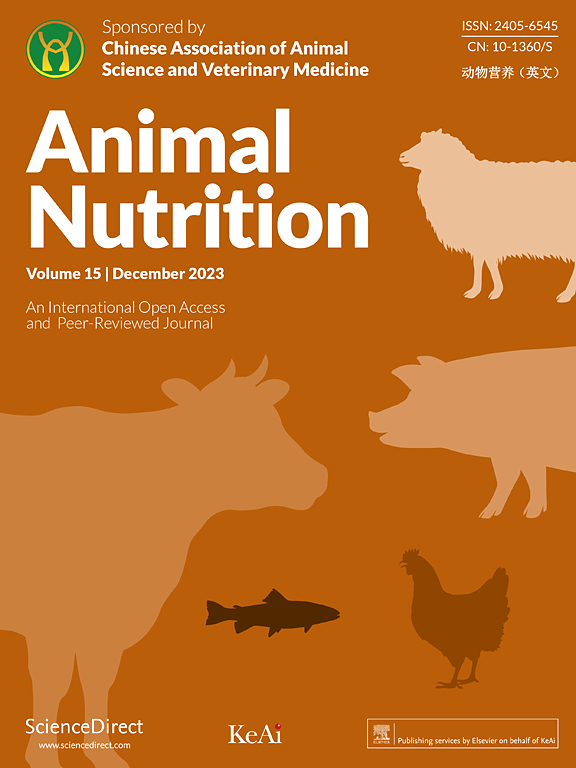卡布其林精油作为饲料添加剂可促进热应激肉牛瘤胃上皮屏障的修复
IF 6.1
1区 农林科学
Q1 AGRICULTURE, DAIRY & ANIMAL SCIENCE
引用次数: 0
摘要
精油(PEO),具有抗氧化、抗炎和抗应激的特性,并能改善胃肠道消化功能。本研究旨在评估 PEO 对热应激肉牛的生产性能、瘤胃上皮形态和屏障功能的影响。将 36 头 18 月龄的雄性靖江牛随机分为四组,分别饲喂精饲料中 PEO 含量为 0(对照组)、50、100 或 150 mg/kg 的日粮(=9)。所有实验牛在夏季高温高湿条件下饲喂 60 天。结果表明,与对照组相比,50 毫克/千克 PEO 处理可提高肉牛的平均日增重 ( = 0.032)。所有 PEO 处理均可降低血清中二胺氧化酶活性(= 0.004)和丙二醛含量(= 0.008)。此外,与对照组相比,100 毫克/千克组的 70 kDa 热休克蛋白含量增加,100 毫克/千克组和 150 毫克/千克组的谷胱甘肽过氧化物酶活性和总抗氧化能力均有所提高(< 0.05)。更重要的是,与对照组相比,PEO 50 mg/kg处理组提高了瘤胃上皮细胞中闭塞素的mRNA相对表达量,但降低了c-Jun N-末端激酶、P38丝裂原活化蛋白激酶、caspase-3和Beclin1的mRNA相对表达量(<0.05),并极显著地降低了细胞外调控蛋白激酶和泛素结合蛋白的mRNA相对表达量(<0.01)。这些研究结果表明,日粮中添加 PEO 可通过下调丝裂原活化蛋白激酶信号通路来改善热应激牛的生长性能和修复受损的瘤胃上皮细胞。本文章由计算机程序翻译,如有差异,请以英文原文为准。
Pogostemon cablin essential oil as feed additive promotes the repair of the rumen epithelial barrier in heat-stressed beef cattle
essential oil (PEO), extracted from , has anti-oxidant, anti-inflammatory, and anti-stress properties, as well as the ability to improve gastrointestinal digestion. This study aims to evaluate the effects of PEO on the performance, rumen epithelial morphology, and barrier function in heat-stressed beef cattle. Thirty-six male Jingjiang cattle at 18 months old were randomly assigned into four groups and fed a diet containing PEO at 0 (control), 50, 100, or 150 mg/kg in the feed concentrate ( = 9). All experimental cattle were fed under high temperature and humidity in summer for 60 days. The results indicated that 50 mg/kg of PEO treatment enhanced the average daily gain of beef cattle compared with the control group ( = 0.032). All PEO treatments reduced the diamine oxidase activity ( = 0.004) and malondialdehyde content ( = 0.008) in serum. In addition, the content of 70 kDa heat shock protein in the 100 mg/kg group was increased, and the activity of glutathione peroxidase and total antioxidant capacity in both 100 mg/kg and 150 mg/kg groups were enhanced compared to the control group ( < 0.05). More importantly, PEO treatment with 50 mg/kg enhanced the mRNA relative expressions of occludin in ruminal epithelia but decreased the mRNA relative expressions of c-Jun N-terminal kinase, P38 mitogen-activated protein kinases, caspase-3, Beclin1 ( < 0.05), and extremely significant declined the mRNA relative expressions of extracellular regulated protein kinases and ubiquitin-binding protein in contrast to the control group ( < 0.01). These findings indicated that dietary PEO supplementation might be favorable to improve growth performance and repairing damaged rumen epithelium of heat-stressed cattle by down-regulating the mitogen-activated protein kinase signaling pathway.
求助全文
通过发布文献求助,成功后即可免费获取论文全文。
去求助
来源期刊

Animal Nutrition
Agricultural and Biological Sciences-Animal Science and Zoology
CiteScore
7.40
自引率
3.20%
发文量
172
审稿时长
12 weeks
期刊介绍:
Animal Nutrition encompasses the full gamut of animal nutritional sciences and reviews including, but not limited to, fundamental aspects of animal nutrition such as nutritional requirements, metabolic studies, body composition, energetics, immunology, neuroscience, microbiology, genetics and molecular and cell biology related to nutrition, and more applied aspects of animal nutrition, such as raw material evaluation, feed additives, nutritive value of novel ingredients and feed safety.
 求助内容:
求助内容: 应助结果提醒方式:
应助结果提醒方式:


